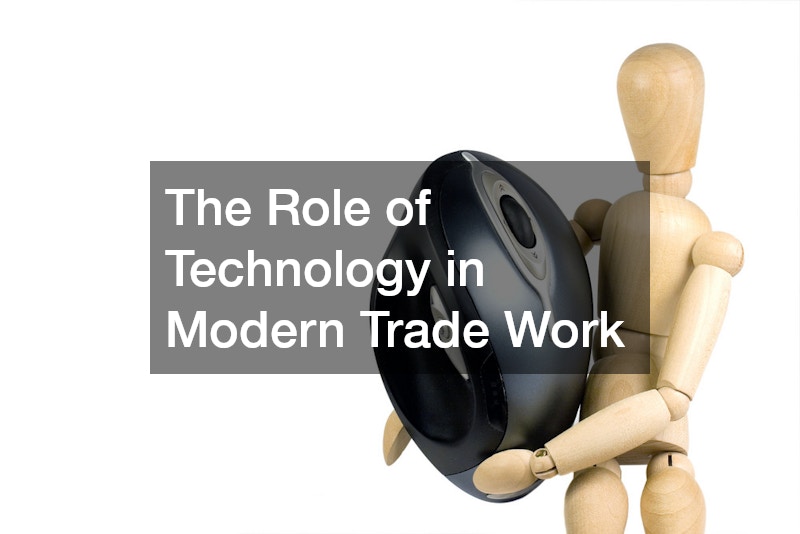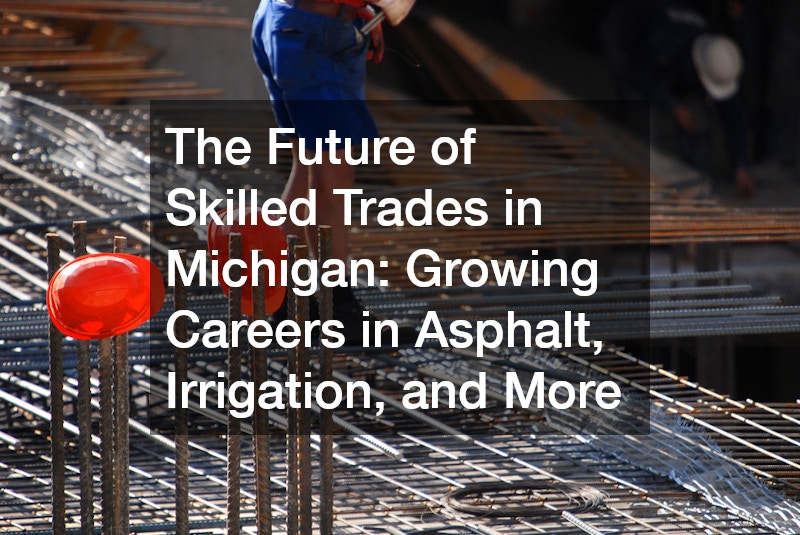The skilled trades in Michigan are not just vital sectors of the economy; they are foundational to the growth and sustainability of communities across the state. With an increasing emphasis on hands-on skills and technical knowledge, there is a significant demand for professionals in various fields. As industries evolve, it is crucial to prepare future workers for the realities of this dynamic environment.
In Michigan, the skilled trades are experiencing a renaissance, driven by advancements in technology and a pressing need for infrastructure repair. This article explores the various aspects of skilled trades in Michigan, emphasizing the importance of training, technological integration, and sustainable practices. By investigating the current landscape, we aim to highlight opportunities for aspiring tradespeople and the broader community.
From welding class training to specialized services like pest control and irrigation installation, the scope of skilled trades in Michigan is broad and varied. With a commitment to developing the skills necessary for future success, we delve into how the state is preparing its workforce. An understanding of these factors will help reinforce Michigan’s position as a leader in skilled trades.
Training for Tomorrow: Preparing for Skilled Trade Careers

Training for skilled trades in Michigan is not just about acquiring a specific skill set; it involves comprehensive programs that equip individuals with the knowledge and experience needed to thrive. Institutions across the state offer a variety of courses, including welding class training, electrical work, plumbing, and industrial insulation, among others. Through hands-on workshops and mentorship, trainees develop a practical understanding of their chosen field.
Moreover, partnerships between educational institutions, community colleges, and local industries enhance the effectiveness of these training programs. This collaborative approach ensures that the curriculum remains relevant and aligned with industry demands. As a result, graduates are well-prepared to enter the workforce and meet the specialized needs of Michigan’s trade sectors.
The growing emphasis on apprenticeship programs further enriches opportunities for training in skilled trades. These programs not only provide practical experience but also foster connections with seasoned professionals who can guide newcomers through the complexities of their careers. In the long run, these initiatives contribute to a robust workforce capable of addressing the evolving needs of Michigan’s economy.
The Role of Technology in Modern Trade Work

As technology continues to advance, its impact on skilled trades in Michigan becomes increasingly pronounced. Tools and processes that enhance efficiency, such as computer-aided design software and automated machinery, are now commonplace in various trade industries. This shift not only streamlines workflows but also demands that workers become adept at using these technologies for maximum productivity.
Incorporating technology into training programs is essential for ensuring that the next generation of tradespeople is prepared for these changes. Educational institutions are adapting their curricula to include technical skills alongside traditional craftsmanship. By focusing on modern tools and methods, students can gain a competitive edge as they enter the skilled workforce.
Moreover, the integration of technology has opened new avenues for skilled labor, including remote monitoring in plumbing and HVAC systems or advanced diagnostics in truck repair services. These advancements allow for quicker and more accurate solutions, reducing downtime and improving customer satisfaction. As technology continues to evolve, so too will the skill sets required in the trades, making ongoing education paramount.
Meeting Michigan’s Infrastructure Needs Through Skilled Trades

The infrastructure of Michigan is in a state of urgent need for skilled repair and maintenance, presenting significant opportunities for workers in skilled trades. From well drilling to asphalt services, tradespeople are essential for ensuring that the state’s infrastructure remains reliable and safe for its residents. As natural wear and tear take their toll, maintaining roads, bridges, and public facilities is paramount.
Furthermore, with growing populations and economic activities, the demand for specialized services such as lift station services and industrial insulation has surged. Skilled trades in Michigan play a vital role in addressing these demands by providing essential repairs and installations that keep local communities functioning. This presents not only job stability for tradespeople but also fosters community development and improvements.
Government investments in infrastructure projects further emphasize the need for skilled labor across Michigan. These initiatives often require substantial teams of workers trained in various trades, including those involved in truck transport to move materials and equipment. By focusing on skilled trades, Michigan can ensure its infrastructure meets current and future demands.
Why Hands-On Training Is Key for Success in the Trades

Hands-on training is the cornerstone of success in skilled trades in Michigan, allowing workers to apply theoretical knowledge in practical settings. This experiential learning helps trainees develop confidence in their skills and prepares them for real-world challenges. Programs that emphasize hands-on experience, such as welding class training and other vocational courses, foster a deeper understanding of the craft.
Furthermore, learning through practice allows for the immediate application of new concepts and techniques. This dynamic method of instruction is critical in fields that involve intricate tasks, where precision and expertise are essential. Engaging directly with tools and materials enhances memory retention and boosts competence in specialized tasks.
The benefits of hands-on training extend beyond individuals to the industries they serve. Well-prepared tradespeople contribute to higher quality workmanship, better safety practices, and greater innovation in the field. By investing in hands-on training, Michigan not only develops skilled labor but also supports the long-term sustainability of its trade industries.
Opportunities for Growth in Michigan’s Trade Industries
The landscape of skilled trades in Michigan is rich with opportunities for growth, driven by current market demands and evolving technologies. With a rising focus on renewable energy and sustainability, trades such as irrigation installation and eco-friendly pest control services are gaining traction. The shift towards environmentally conscious practices creates new avenues for skilled workers to innovate and lead in their fields.
Additionally, the expansion of industries such as automotive, construction, and manufacturing highlights the need for specialized labor. For instance, local hydraulic repairs and truck repair services are essential to keeping vital operations running smoothly. As new technologies and methodologies emerge, there is an increasing demand for trained professionals who can adapt and apply their skills in these advanced settings.
Moreover, Michigan’s ongoing commitment to workforce development supports initiatives that encourage individuals to pursue careers in skilled trades. Programs designed to attract young talent, coupled with incentives for businesses to invest in apprenticeships, help bridge the skills gap. This creates a more vibrant labor market and assures that Michigan remains competitive in the face of rapid technological changes.
The Rising Demand for Skilled Labor in Local Communities
The rising demand for skilled labor in local communities across Michigan is fueled by a combination of economic growth and an aging workforce. As experienced tradespeople retire, there is a pressing need for new professionals to fill the gaps in vital services such as plumbing, electrical work, and truck repair service. Communities are increasingly recognizing the importance of investing in skilled trades to ensure their continued growth and sustainability.
This demand creates plentiful job opportunities for young people and job seekers looking for stable and lucrative career paths. Local industries are also benefiting by bolstering their teams with fresh talent who bring innovative perspectives and ideas. Investing in skilled trades ensures that local communities can respond to emerging needs and challenges effectively.
Public outreach efforts, such as career fairs and community workshops, play a crucial role in raising awareness about the benefits of pursuing careers in skilled trades. Institutions and organizations are collaborating to showcase the diverse opportunities available, from welding class training to specialized services like commercial pest control and industrial insulation. By encouraging local participation, communities can strengthen their skilled workforce and reinforce Michigan’s economic foundation.
Sustainable Solutions in Trades: A Growing Focus for the Future
Sustainability is becoming an increasingly integral part of skilled trades in Michigan, with many industries prioritizing eco-friendly practices. Whether it’s through improving energy efficiency in buildings or utilizing renewable materials in construction, tradespeople are at the forefront of this movement. This trend is not only beneficial for the environment but also creates new niches for skilled workers.
For instance, professionals engaged in irrigation installation and well drilling are adapting their practices to promote water conservation and minimize environmental impact. Similarly, pest control services are evolving to incorporate sustainable methods that protect human health and the ecosystem. These initiatives demonstrate how skilled labor can contribute to broader sustainability goals while paving the way for innovative services.
Moreover, state policies that promote green technologies are shaping the future of skilled trades in Michigan. As incentive programs emerge for companies adopting sustainable practices, there is a growing market for tradespeople who possess the relevant knowledge and skills. Training programs that incorporate sustainability will empower workers to thrive in a greener economy and respond to changing market demands effectively.
The Connection Between Trade Skills and Community Development
The connection between skilled trades in Michigan and community development is strong and multifaceted. Skilled trades contribute directly to the quality of life in local areas by building and maintaining essential infrastructure such as roads, schools, and recreational facilities. This not only fosters a sense of community pride but also attracts businesses and families looking for a supportive environment.
Furthermore, the presence of skilled labor contributes to economic stability and growth. When local tradespeople succeed in their professions, they enhance the overall economic health of their communities. Investment in skilled trades training programs can lead to job growth, increased spending, and improved educational outcomes, creating a cycle of positive development.
Ultimately, by prioritizing skilled trades, Michigan can ensure its communities remain vibrant and capable of adapting to change. Engaging local stakeholders—such as schools, businesses, and municipalities—in initiatives that support trades can strengthen these connections. Emphasizing the role of skilled labor in community development will help cultivate a more resilient and prosperous Michigan.
Evolving Roles in Skilled Trades: What Workers Need to Know
The roles within skilled trades in Michigan are continuously evolving, requiring workers to remain adaptable and proactive in their professional development. With advancements in technology and shifts in industry standards, tradespeople must stay current with new techniques and tools. Embracing lifelong learning is not only beneficial but essential for long-term career sustainability.
Workers should seek out training opportunities that focus on both traditional skills and modern innovations. For example, those in truck repair service must keep abreast of new diagnostic technologies, while welders benefit from familiarizing themselves with advanced welding techniques. By being versatile and open to change, skilled tradespeople can enhance their marketability and career prospects.
Networking with industry professionals and participating in trade associations can further accelerate career development. Engaging with peers provides insights into emerging trends and best practices, while attending workshops and seminars ensures exposure to new ideas. In an ever-evolving landscape, collaboration and knowledge-sharing are key to remaining competitive in skilled trades.
Supporting Michigan’s Economy Through Trade Careers
Supporting the economy of Michigan through trade careers is more critical now than ever before. With a growing emphasis on local sourcing and resource management, skilled tradespeople contribute significantly to the state’s GDP and employment rates. From providing reliable local hydraulic repairs to industrial insulation, trades directly correlate with the maintenance of a strong economic foundation.
The ripple effects of a robust skilled trades workforce extend far beyond individual earnings. As tradespeople secure their positions, they invest back into their communities through spending on housing, education, and local businesses. This interdependence reinforces the importance of sustaining and developing a skilled workforce in Michigan.
Moreover, supporting skilled trades through policy changes can help address workforce shortages and elevate the profession’s stature. Advocating for improved access to training programs and resources fosters a sense of dignity associated with these careers. By prioritizing trade skills, Michigan can ensure a thriving economy that is resilient to shifts in the labor market.
From Training to Mastery: Building Long-Term Careers in Trades
Transitioning from initial training to mastery in skilled trades requires dedication, persistence, and a commitment to continuous improvement. Engaging in ongoing education and specialized training ensures that tradespeople remain proficient in their craft. Understanding that mastery is a journey rather than a destination can lead to fulfilling careers that adapt to personal and industry growth.
Many successful tradespeople begin with foundational training in programs such as welding class training or construction. From there, they can pursue further certifications and specializations that can enhance their earning potential and career trajectory. Investing time and resources into advanced training solidifies one’s place as an expert in their field.
Moreover, mentors play a significant role in guiding tradespeople through their career development. These experienced professionals offer invaluable insights, share best practices, and encourage the next generation to take on leadership roles. Cultivating strong relationships within the industry creates a support system that uplifts individuals and the profession as a whole.
Exploring the Career Potential of Specialized Trade Services
The career potential of specialized trade services in Michigan is vast and varied, offering numerous paths for individuals to consider. Fields such as industrial insulation contractors and pest control services provide unique opportunities that are essential for specific industries. These specialized roles not only enhance the functionality of various operations but also present opportunities for personal and professional growth.
Individuals interested in specialized roles often find that they can earn competitive salaries while helping to meet critical industry needs. This is particularly evident in sectors that require expertise in areas such as lift station services or well drilling. As markets expand, the demand for skilled professionals equipped with specialized knowledge continues to grow.
Moreover, the possibility of entrepreneurship exists within specialized trades, allowing skilled workers to start their own businesses. Many tradespeople leverage their expertise to create successful ventures, such as providing local hydraulic repairs or offering comprehensive truck repair services. The flexibility and independence offered in specialized trade careers attract many individuals seeking a fulfilling professional journey.
Michigan’s Commitment to Skilled Labor: The Path Forward
Michigan’s commitment to fostering a skilled labor workforce is evident in ongoing initiatives and collaborations aimed at enhancing trade training and education. State officials and industry leaders recognize the importance of sustaining skilled trades for the overall economic growth of the region. By prioritizing funding for vocational programs and incentivizing apprenticeship opportunities, Michigan is creating pathways for aspiring tradespeople to enter the workforce successfully.
Additionally, legislative efforts that support workforce development play a crucial role in shaping the future of skilled trades in Michigan. As policies evolve to address industry needs and worker shortages, it becomes vital to integrate skilled labor into broader economic planning. This collaborative approach ensures that Michigan remains a leader in skilled trades while providing essential services and infrastructure.
Looking ahead, embracing innovation and diversification within the skilled trades will be pivotal for Michigan’s economy. The state’s focus on sustainability, technology integration, and community development will create new opportunities for skilled tradespeople. By investing in these areas, Michigan can continue to build a strong, adaptable workforce ready to meet the challenges of the future.
The landscape of skilled trades in Michigan is rich with opportunity, shaped by a commitment to training, innovation, and sustainability. As demand for skilled labor continues to rise, it is critical to develop pathways that equip individuals with the skills needed to succeed. Emphasizing hands-on training, technological integration, and community investment will ensure a vibrant skilled labor market.
The future of skilled trades in Michigan looks promising, driven by the collaboration of educational institutions, industries, and community leaders. By nurturing talent and promoting trade careers, the state can build a more resilient economy and stronger communities. Ultimately, the skilled trades represent not only jobs but also a commitment to growth, sustainability, and development across Michigan.
